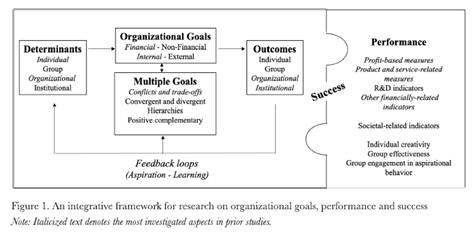
Summary
Our article, published in the Journal of Management Studies, takes stock of what we know about organizational goals and success. We focus on their determinants and outcomes as captured in Figure 1, and propose future areas of fruitful future research.

Our efforts are intended to highlight and advance goal-setting research, and to re-define the traditional understanding of success. With that in mind, we have identified 4 areas that in our view warrant further attention for scholars to research within the management field:
- Reconceptualizing performance (and success) as achievement of goals
- Considering the diversity of goal systems in research design, and their relationship with the purpose of an organization
- Multi-level temporal dynamics
- Governance of goal setting
Our main findings
We queried Scopus for articles published since January 2012 in top peer reviewed academic journals within the field of management that contained the following keywords in their abstracts: “goals”, “performance”, and “success.” Out of the 110 identified articles, 46 articles were dropped due to poor fit within the topic of Organizational Process and Success. We focused on the remaining 64 articles, details of which can be found in our article.
Our findings show that organizations primarily rely on financial-based measures, product and service measures, or R&D measures to operationalize performance. Very few organizations rely on using societal-related measures, or ESG (Environmental, Social, and Governance) factors to capture performance. Additionally, prior research largely focuses on efficiency rather than effectiveness and does not assess the outcomes of performance given a set of goals. Contemporary research rarely specified the goals to be achieved, hence introducing a limitation on the extent to which a connection can be drawn between goals, performance, and success.
When conceptualizing success, we encourage management scholars to consider performance in terms of goal achievement. Measuring success is co-dependent on the goals originally set as well as the performance executed along the way. Therefore, a rigorous conceptualization of success in terms of achievement of goals should consider micro-contextual, meso-contextual, macro-contextual, and chrono-contextual factors.
What are our key takeaway messages?
Our findings have implications for both our academic colleagues, who are looking to understand the bulk of existing research on the topic of organizational goals and performance within the field of management, and professionals within organizations, such as C-suite executives or mid-level managers, responsible for determining the goals and direction of their respective organizations and/or teams.
The key lessons/ messages that can be learned from our study are as follows:
- There are few to no articles that cover the breadth of external organizational goals related to societal or community improvement.
- The assessment of performance depends critically on how organizational goals and outcomes are defined and measured.
- Management scholars should exercise caution when considering the literature comparing the financial performance of organizations and previous attempts to understand what it takes for an organization to be successful.
Our article is primarily intended to intrigue, inform, and entice management academics keen on advancing the study the close-knit relationship between organizational goals, outcomes, performance and success.

0 Comments